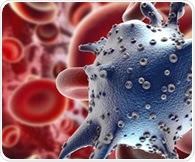|
|
| | January 18, 2018 | |
| | |
| | The latest prostate cancer news from News Medical | |
|
|
|
|
 |
| | | |  Research sheds new light on genetic, environmental factors that promote prostate cancer metastasis Research sheds new light on genetic, environmental factors that promote prostate cancer metastasis
Prostate tumors tend to be what scientists call "indolent" - so slow-growing and self-contained that many affected men die with prostate cancer, not of it. But for the percentage of men whose prostate tumors metastasize, the disease is invariably fatal. | |
 |
| | | |  Men who follow Mediterranean diet have lower risk of aggressive prostate cancer, study finds Men who follow Mediterranean diet have lower risk of aggressive prostate cancer, study finds
In a new study published in The Journal of Urology, researchers determined that men who followed a Mediterranean diet, rich in fish, boiled potatoes, whole fruits, vegetables, legumes, and olive oil, and low consumption of juices had lower risk of aggressive prostate cancer than those who followed other dietary patterns like Prudent or Western diets. | |
 |
| | | |  Prostate cancer’s gene-determined ‘immune landscape’ dictates tumor progression Prostate cancer’s gene-determined ‘immune landscape’ dictates tumor progression
The field of immunotherapy - the harnessing of patients' own immune systems to fend off cancer - is revolutionizing cancer treatment today. However, clinical trials often show marked improvements in only small subsets of patients, suggesting that as-yet unidentified variations among tumors result in distinct paths of disease progression and response to therapy. | |
|
|
|
 |
| |
 Advanced glycation end products, which have been linked to many chronic diseases, including diabetes, cardiovascular disease and cancer, build up in the body from birth due to normal metabolism but are often higher in those eating the high-fat, high-sugar, highly processed foods characteristic of the Western diet. Advanced glycation end products, which have been linked to many chronic diseases, including diabetes, cardiovascular disease and cancer, build up in the body from birth due to normal metabolism but are often higher in those eating the high-fat, high-sugar, highly processed foods characteristic of the Western diet. | |
|
| |
 An international team of researchers led from Karolinska Institutet and Science for Life Laboratory in Sweden have found a new way of halting the growth of breast cancer cells. An international team of researchers led from Karolinska Institutet and Science for Life Laboratory in Sweden have found a new way of halting the growth of breast cancer cells. | |
|
| |
 A University of Illinois and Mayo collaboration has demonstrated a novel gene expression analysis technique that can accurately measure levels of RNA quickly and directly from a cancerous tissue sample while preserving the spatial information across the tissue --something that conventional methods cannot do. A University of Illinois and Mayo collaboration has demonstrated a novel gene expression analysis technique that can accurately measure levels of RNA quickly and directly from a cancerous tissue sample while preserving the spatial information across the tissue --something that conventional methods cannot do. | |
|
| |
 A new study shows that stress accelerates the development of pancreatic cancer by triggering the release of "fight-or-flight" hormones. Beta-blockers--commonly used medications that inhibit these hormones--were found to increase survival in a mouse model of the disease. A new study shows that stress accelerates the development of pancreatic cancer by triggering the release of "fight-or-flight" hormones. Beta-blockers--commonly used medications that inhibit these hormones--were found to increase survival in a mouse model of the disease. | |
|
|
|
|
|
































.png)









No hay comentarios:
Publicar un comentario